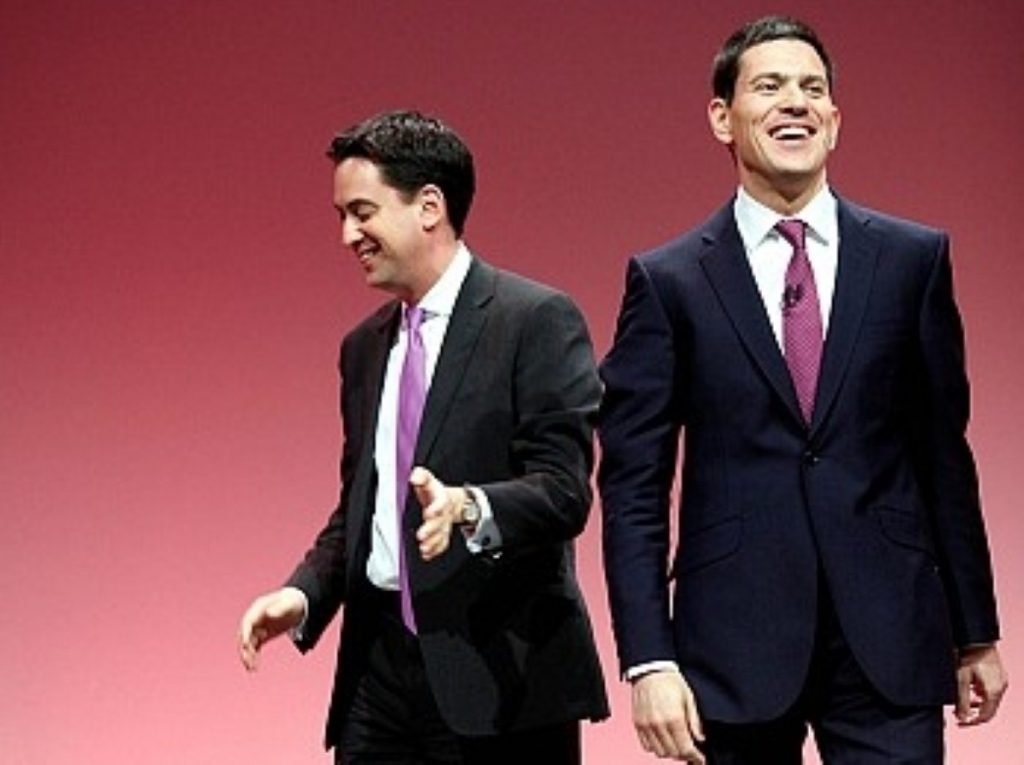David Miliband sketch: Neither rebellion nor loyalty
David Miliband is the summer blockbuster of political leaders – good to look at, but the plot is full of holes.
By Ian Dunt
The snow plot. Last winter. One by one Cabinet secretaries come out to express support for the prime minister. The hacks are in the Westminster bars, unable to go home until all the major contenders for the post rule themselves out. David Miliband was the last, coming well into the evening. I remember watching him stick to a vague and ambiguous line and thinking: ‘slippery customer that one’. A year or so earlier, he had written that absurd piece for the Guardian, saying nothing about his ambition for leadership while all the while screaming about it.
This is not a man who shoots from the hip. This is a man who demands deconstruction. And so it was today that the elder Miliband took to the stage and offered a lukewarm statement of support for his brother.


“I’m really, really, really proud. I’m so proud of my campaign, I’m so proud of my party, but above all I’m incredibly proud of my brother,” he said, with all the determined air of a man doing what needs to be done. “Our job is to make him a special person for all the British people,” he continued, rather patronisingly.
So far so good, but there was no attempt to end speculation about his future today. He launched into the subject everyone’s talking about, but didn’t close it up. He allowed the story to continue. Evidently David still hasn’t decided whether he wants to become chancellor, or it suits his interests not to discuss it.
There was the foreign policy brief, in which he resolutely stuck to his New Labour guns, no matter that his brother won. An “independent foreign policy”, he told us, meant we should follow the world’s one superpower. That’s classic double-think, by the way, but it directly contradicts what Ed told this website earlier this month. “Yes, the relationship with the US is important,” he told us, “but you’ve got to be stronger about saying we’ve got an independent foreign policy.”
He spoke without a script or a lectern, blazer off, gesticulating confidently – the exact same approach which first raised questions of Ed’s leadership ambitions at conference not so long ago.
The response from the hall was wildly enthusiastic. They cheered him at the start and they rose to their feet at the end. But his performance today exhibited many of the weaknesses which made Ed Miliband the wisest choice. It’s true that on first sight he appears confident, prime ministerial and impressive. But that’s ultimately superficial. His speeches hold so little content that they become quickly tedious. His ability with language is open to ridicule. “The opposite of cynicism is hard-headed internationalism,” he said at one point, rather absurdly. “I want historians to say about this conference: the fightback has already begun,” he continued, without any concern for tense or logic.
These are seemingly small faults, but they add up to something vulnerable, especially when they are framed with such supremely establishment views. There is no status quo David Miliband will leave unprotected, from American dominance to the war on terror. The man’s approach genuinely seems to be to out-establishment the Tories, which seems to me a difficult and pointless task. When his political offerings are so drab and unexciting, one demands that the presentation be pristine.
The media loves a bit of psychodrama, so the reviews for today’s speech will be gushing, just to complicate matters. But David Miliband is not the Brian Clough of Labour. He’s not the best leader they never had. He’s a summer blockbuster: impressive to look at but with paper-thin characterisation and a plot that’s full of holes.












